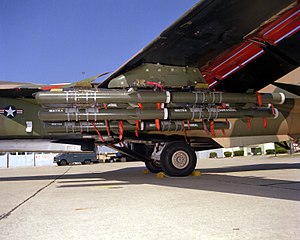| Matra Durandal | |
|---|---|
 An American F-111 carrying BLU-107 Durandals in December 1981. An American F-111 carrying BLU-107 Durandals in December 1981. | |
| Type | Anti-runway bomb |
| Place of origin | France |
| Service history | |
| In service | 1977–present |
| Used by | United States, France, Israel |
| Wars | Gulf War (1991) |
| Production history | |
| Manufacturer | Matra (now MBDA) |
| Specifications | |
| Mass | 200 kg (440 lb) |
| Length | 2.7 m (8 ft 10 in) |
| Diameter | 22.3 cm (8.8 in) |
| Warhead weight | 100 kg (220 lb) primary charge 15 kg (33 lb) secondary charge |
The Durandal is an anti-runway penetration bomb developed by the French company Matra (now MBDA), designed to destroy airport runways and exported to several countries. A simple crater in a runway could be filled in without issue, so the Durandal uses two explosions to displace the concrete slabs of a runway, thus making the damage to the runway far more difficult to repair. The bomb is named after a mythical medieval French sword.
Overview
| This section needs additional citations for verification. Please help improve this article by adding citations to reliable sources in this section. Unsourced material may be challenged and removed. (July 2011) (Learn how and when to remove this message) |
Designed to be dropped from low altitudes, the bomb's fall is slowed by a parachute. The maximum release speed is 550 knots (1,020 km/h; 630 mph) and the minimum release altitude is 200 feet (61 m). When the bomb has reached a 40° angle due to the parachute's drag, it fires a rocket booster that accelerates it into the runway surface. The 100-kilogram (220 lb) primary charge explodes after the weapon has penetrated the concrete and drives the secondary charge even deeper. The 15-kilogram (33 lb) secondary charge then explodes after a one-second delay. Later production weapons have a programmable fuse that can delay the secondary detonation up to several hours.
The weapon can penetrate up to 40 centimetres (16 in) of concrete, and creates a crater 2 metres (6 ft 7 in) deep and approximately 5 metres (16 ft) in diameter. In addition, concrete slabs around the crater are disturbed in an area approximately 15 metres (49 ft) in diameter. The disturbed slabs are displaced up to 50 centimetres (20 in) above the original surface, making repair more difficult than the simple crater from a conventional bomb.
Service history
There is a persistent story that the first use of the current Matra Durandal was by Israeli Mirages during the Six-Day War. This is inaccurate, as this war took place ten years before the Durandal was first available on the arms market. Rather, the prototype French/Israeli anti-runway weapon program which cratered Egyptian runways in 1967 is related, but distinct from the Durandal. The Israeli weapon used rockets rather than parachutes to brake over the target. The Matra development branch was in development from 1971 on and would form the basis for the Durandal which uses parachute braking.

The Durandal was adopted by the US in a slightly modified form (with a steeper impact angle and a higher 630 knot deployment speed) as the BLU-107/B in the 1980s, and carried by F-111 and F-15E strike aircraft.
| The U.S. Air Force procurement program for Durandal | ||||||
|---|---|---|---|---|---|---|
| Fiscal Year | 1983 | 1984 | 1985 | 1986 | 1987 | Total |
| Dollars in millions | 9.2 | 23.3 | 87.5 | 184.1 | 195.1 | 499.2 |
| Quantity | 350 | 840 | 3,000 | 6,000 | 6,000 | 16,190 |
In addition, the Durandal is in service with Argentina, Turkey, and at least 14 other nations. The Durandal is not currently in the weapon inventory of the French Armée de l'Air
It was used by the US Air Force in Desert Storm, delivered by F-111E's of the 20th Fighter Wing based in Turkey. 20th Wing flight commander Captain George Kelman said "there is nothing better at destroying a runway than a Durandal."
It has been reported that China has developed its own anti-runway bombs, the Type 200A, using Durandals as models. In the 1980s, China purchased a number of Durandals from France.
Users
| This section needs additional citations for verification. Please help improve this article by adding citations to reliable sources in this section. Unsourced material may be challenged and removed. (September 2019) (Learn how and when to remove this message) |

 Argentina
Argentina Brazil
Brazil China
China Ecuador
Ecuador Egypt
Egypt France
France Greece
Greece Jordan
Jordan Libya
Libya Nigeria
Nigeria Oman
Oman Pakistan
Pakistan Serbia
Serbia South Korea
South Korea Turkey
Turkey United States
United States Venezuela
Venezuela Yugoslavia
Yugoslavia
See also
- BAPI – A Brazilian anti-runway weapon
- DRDO SAAW – An Indian precision-guided anti-airfield weapon
- JP233 – A British anti-runway weapon
- BAP 100 – A smaller French anti-runway weapon adopted by the French Air Force
References
- ^ "Ordnance & Munitions Forecast". www.docstoc.com. Archived from the original on 19 October 2013. Retrieved 23 July 2011.
- "Jane's Air Launched Weapons". Jane's Information group. 12 January 2010. Archived from the original on 26 April 2012. Retrieved 23 July 2011.
- "Dassault Mirage: The Combat Log", Salvador Mafe Huertas, page-41, ISBN 978-0764301681
- Department of Defense appropriations for 1983, pt. 7, p. 483.
- "MBDA (Matra) BLU-107/B Durandal". www.designation-systems.net. Retrieved 23 July 2011.
- "BLU-107 Durandal - Dumb Bombs". www.globalsecurity.org. Retrieved 23 July 2011.
- "U.S. out of anger: After Chinese copy of Russian weapons and turned to France". www.9abc.net. Archived from the original on 21 February 2013.
- Chenel, Bernard; Liébert, Michel; Moreau, Eric (2014). Mirage III/5/50 en service à l'étranger. Le Vigen, France: Editions LELA Presse. p. 280. ISBN 978-2-914-017-763.
External links
Categories: